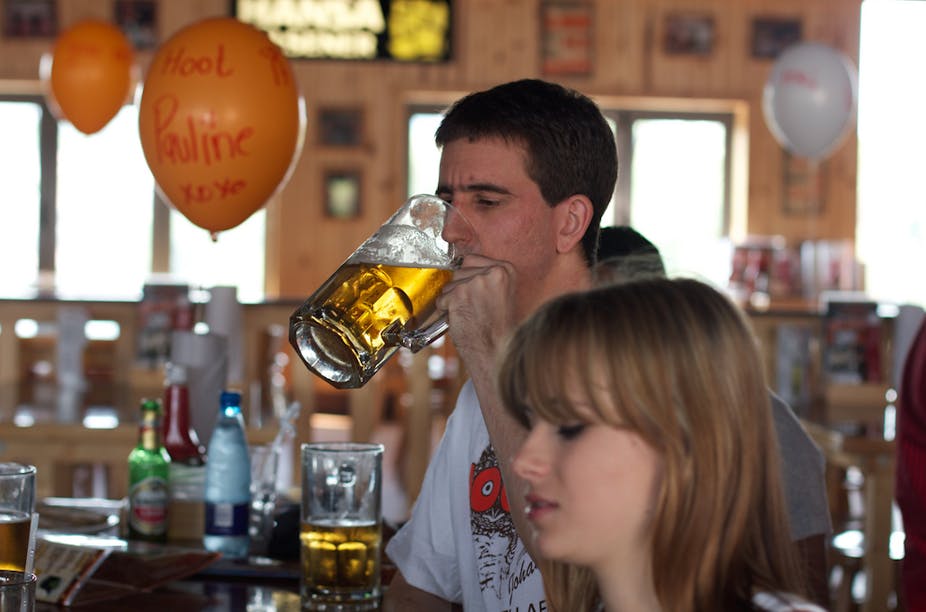Neknomination seems to have begun as a UK university phenomenon in 2012, but more recently burst into wider public consciousness in Australia, then South Africa and Canada. It has also been tragically linked to two deaths in Ireland.
Originally termed “neck and nominate”, it involves videoing a person drinking, or “necking”, a pint of beer in one go before “nominating” someone else to do the same online, within 24 hours.
Subsequent responses have become more elaborate, with multiple or stronger drinks – such as vodka – in unusual costumes or in remote locations.
While the earliest video on YouTube appears to be UK-based and dates from November 2012, the most popular associated Facebook account was created in early January 2014 and appears to be Australian in origin.
Interestingly, just a few days before it was set up, former Australian Prime Minister, Bob Hawke, was successfully egged on by a crowd of cricket fans to neck a pint of beer. He was also well known for holding the record for fastest sculling of a yard of beer (1.4 litres or 2.5 pints) at Oxford University in 11 seconds. It is perhaps unsurprising that many of his young fellow countrymen followed his example.
But why do people feel obliged to partake in, and indeed amplify, these nominations? To understand this new behaviour, we need a new understanding – something we’re working on at RCSI CyberPsychology Research Centre in Ireland.
While the internet raises the prospect that things we do will be recorded for posterity, online behaviour occurs psychologically within a different space – when we are online we act as if we are in a different environment, which has different rules and norms. In cyberspace, our inhibitions are reduced and we do and say things that we would not if we were face-to-face.
This online disinhibition effect has been most notably expounded by John Suler of Rider University. It has also been put forward that disinhibited behaviour is common not only to alcohol use, but when people feel powerful or anonymous.
We also know there are powerful paradoxes at play on the internet – we browse the internet in private, yet our status updates are instantly public, and at the same time the majority of the content is made by a small minority, the rest of us merely lurk. Our profile pages are carefully curated with associations and connections, demonstrations of values and social capital. But when nominated to drink, participants are thrust onto a very public stage, not of their own making, upon which they are called to act. In effect, they are already intoxicated before any drink is taken.
So the internet is already one kind of high. In the same way that using cocaine and alcohol together can produce cocaethylene in the liver, which further increases the physiological effect, when internet browsing is combined with alcohol, the disinhibitory effects can be intense, incremental and tragic.
Irish minister Pat Rabbitte has called for a shutdown of pages associated with #neknominations, while Facebook has said they don’t actually breach its community rules. This is disappointing, given the large number of impressionable children, not only who are under 18 but under 13, who are on social networks, and where it hasn’t been established that they are capable of engaging in a safe manner.
These videos are present on many social networks, including YouTube, Twitter and Instagram, and we have to reflect on the role of these companies in regulating this alcohol-related content, which is unlikely to be an acceptable to be broadcast on traditional media. What is essential in this context is that not only should more attention be given by these internet giants to efforts to quarantine problematic things that go viral, but that we take more time to learn about our own personal internet behaviour. It isn’t just a channel, but a portal to an environment where social norms are altered – and not always for the better.

